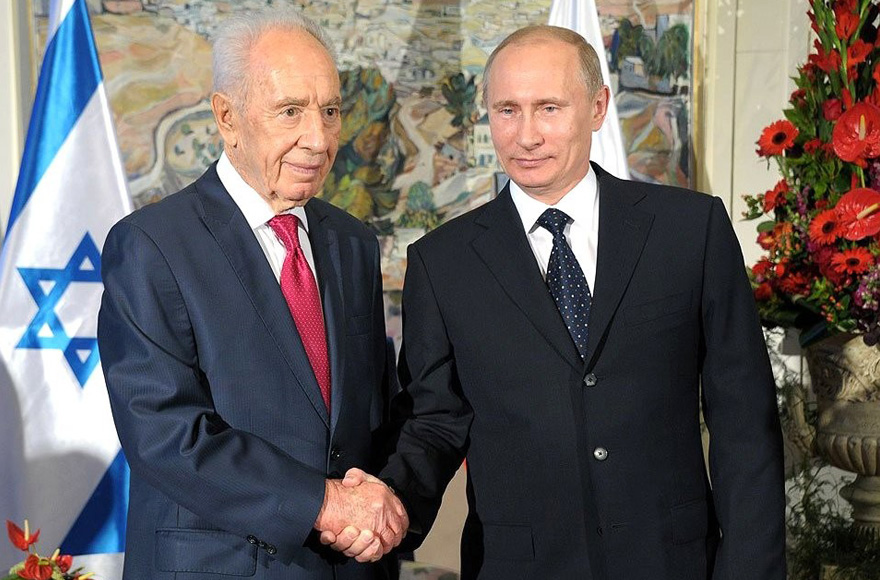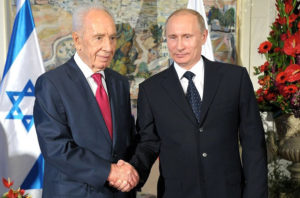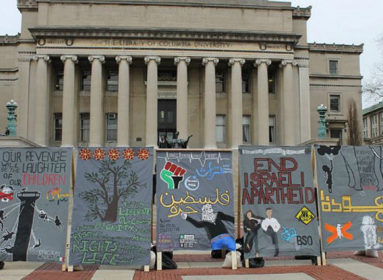
By Charles Dunst

Russian President Vladimir Putin, right, greeting his Israeli counterpart Shimon Peres in Moscow, 2012. (Office of the President of Russia)
(JTA) — While American politicians and pundits fumed at President Donald Trump’s performance at his much-anticipated meeting this week with Russian President Vladimir Putin, lost in the clamor was one small but crucial moment: Israel emerged from Helsinki a winner.
Trump said that he and Putin had reached a “really good conclusion” for Israel in regard to the situation in Syria. The Russian leader said he paid “special attention” to the Jewish state during the negotiations.
Trump’s unflinching support for Israel — perhaps a result of evangelical enthusiasm for the country, ideological nudging from his Jewish daughter and son-in-law or the continued need to rebuke all things Obama — is well documented. But Putin’s continuing support for the Jewish state is unexpected, especially since he backs Syria’s Bashar Assad, a war criminal whose prosaic regional interests often defy Israel’s.
Even more counterintuitive is the motivation behind his Jewish outreach: his raging nationalism — Putin’s deeply held belief that it is his personal duty to Make Russia Great Again.
“Russia’s President Vladimir Putin, czar in all but name, has a genius for mining the ore of Russian nationalism,” Ralph Peters of the Hoover Institution writes.
Masha Lipman’s 2014 article in The New Yorker says Putin often frames his increasingly expansionist foreign policy around such nationalism, particularly “as a protection of ‘ours’ — and ‘ours’ are Russian, no matter where they live.”
Putin has made considerable efforts to reach out to Russian Jewish communities, both within his state’s borders and in Israel. His country’s chief rabbi, Berel Lazar, is a close confidante. According to his biographers, Fiona Hill and Clifford Gaddy,
he has “encouraged Russian oligarchs – irrespective of their ethnic or religious origin – to fund the restoration of synagogues and mosques, not just churches.”
“For Putin, Russia’s multiethnic, indigenous culture … must be preserved and actively maintained for the state to survive,” Hill, senior director for European and Russian Affairs on Trump’s National Security Council, and Gaddy, a former Brookings Institution fellow, write in their book Mr. Putin: Operative in the Kremlin.
“In Putin’s view, the Bolsheviks made a serious mistake in destroying these cultural artifacts,” which the authors say otherwise could have been “useful history for binding all the different groups together and creating a common heritage.”
Putin’s nationalism, unlike its Soviet predecessor, incorporates and claims ethnic minority groups, including Jews, weaving “ours” into the narrative governing Russian history and future in an effort to unite the Russian people and restore the former empire.
In a September 2010 meeting with then-Israeli Defense Minister Ehud Barak, Putin “in addition to stressing the importance of reaching out to Russian emigres,” write Hill and Gaddy, “talked wistfully of bringing back ‘our Jews’ who had emigrated to Israel.” They say Putin “rejected the idea that former Jewish citizens of the Russian Empire and Soviet Union might not want to come back to Russia” given previous discrimination.
A 2017 report indicated that the number of Russians emigrating from Israel to their ethnic homeland is rising.
Rabbi Boruch Gorin, a senior figure within Russia’s Chabad-affiliated Federation of Jewish Communities, indicates that Putin’s conception of Russia, unlike its Soviet iteration, includes Jews.
“I believe that he has a sort of Russian nationalism, that they call patriotism, that includes all of the ‘native’ Russians in Mother Russian ethnicity — and Russian Jews are in as well,” Gorin told JTA in an email. “He is interested in the strong (sort of best) Russian Jewish community, as a matter of Russian pride.”
When a member of the Russian Duma suggested changing the state’s constitution in 2012 to remove the inclusive “we the multinational people of Russia” in favor of the exclusive “we the [ethnic] Russian people,” Putin dismissed the idea.
“We must not do that if you and I want to have a strong single nation,” Putin said, according to Hill and Gaddy. “The fact that the [ethnic] Russian people are – without a doubt – the backbone [of Russia] … cannot be questioned.” To divide everyone up, he said, “this is a very dangerous path. You and I, all of us, must not do this.”
When met with legitimate accusations of historical Soviet and contemporary Russian antisemitism, Putin has shifted blame elsewhere, particularly on the Ukrainians. And yet, “Whatever his many other sins, even Vladimir Putin’s harshest critics concede that he’s not an antisemite,” writes Joshua Keating in Slate.
Asked if antisemitism has become less prevalent in recent years, Gorin told JTA, “sure it has.” The rabbi said it’s partly because of the huge Jewish migration from the Soviet Union, “as [now there is] nobody to hate,” but also “partly because of Putin’s positive steps toward the Jewish community.”
Experts report that antisemitism in Russia is in decline, and JTA has reported how the Russian judiciary has cracked down on antisemitic intimidation.
“The complete absence of antisemitism on the part of Boris Yeltsin has been well-documented, and that seems to be true for Putin as well,” David Rivera, visiting assistant professor of government at Hamilton College and former director of the Harvard Russian Institute of International Affairs in Moscow, told JTA. “Indeed, Yeltsin probably would not have chosen Putin to be his successor as president had he detected any antisemitism on Putin’s part.”
Marvin Kalb, a Brookings Institution fellow who authored the 2015 book Imperial Gamble: Putin, Ukraine, and the New Cold War, suggested that Putin’s courting of Russia’s Jews is the result of cold calculation, not emotion.
“He reaches out to the Jews of Russia for reasons relating to old-fashioned Slavic antisemitism and the new requirements of Russian policy in the Middle East,” Kalb told JTA in an email. “Russian nationalists have long believed that Jews are troublemakers, capable of arousing the public with anti-establishment (anti-Putin) sentiments. Better, if possible, to soothe their unhappiness with mild, agreeable words.
“Russia’s position in the Middle East is now paramount, Putin having achieved what no Tsar could before him,” he continued. “In this new power role, he tries to serve as middleman between Israel and the Arabs — and Iran. It requires balancing interests, and so far he has done very well. Putin is a cold, calculating Russian nationalist, with little love or feeling for anyone who does not share this background and beliefs.
“Historically, Jews have not been part of this world.”
Putin’s calculations have long resulted in overtures to Israel. While wrapping up a visit to Moscow in 2000, Israeli politician and former Soviet dissident Natan Sharansky received a call from the Kremlin inviting him to a private lunch with the Russian president.
Putin “said it wasn’t simple in the KGB being sympathetic to Jews,” Sharansky told the Post. “But he told me how he grew up in [a] communal apartment and there was a Jewish family there which for him were almost like relatives. He liked them very much.”
Sharansky, according to The Washington Post, said “Putin spent much of the lunch expressing … his sympathy for Israel, his distaste for antisemitism and the importance he attaches to Jews in Russia and the Jewish Diaspora.” The Post noted that perhaps like Israel at large, Sharansky “was impressed by Putin’s overture to Diaspora Jews — regardless of the motivation behind it.”
In 2005, Putin visited the Jewish state, meeting not only with then-Prime Minister Ariel Sharon but also with his Jewish high school German teacher who had emigrated, reportedly buying her a Tel Aviv apartment. (Putin inherited the apartment when she died; the Russian Embassy sent a representative to her 2018 funeral and covered its costs.) In 2012, Putin invited then-Israeli President Shimon Peres to Moscow for the dedication of the Jewish Museum and Center of Tolerance, telling him “we will never forget the sacrifices made by the Jewish people in the fight against Nazism, and we will never forget the Holocaust.”
A few months earlier, Putin had traveled to Israel for the dedication of a monument – the Victory Monument in Netanya – thanking the Red Army. During the visit, Putin promised that he “would not let a million Russians live under threat,” referring to Israel’s Russian-speaking immigrant population. In Moscow, months later, Putin reminded Peres of the dedication, noting: “Just recently, the two of us attended in Israel the unveiling of a monument to the Red Army, which made enormous sacrifices for our shared victory over Nazism.”
In referencing a “shared victory” between the once stateless Jewish people and a state that no longer exists, Putin is willing into existence a historical, although strong, relationship likely to be welcomed by the Israelis: a timeless and necessary one between Jews and the Russian people, providing survival for both.
Putin and Israeli Prime Minister Benjamin Netanyahu have met in Russia and in Israel, pursuing future “shared victories” and strengthening a fledgling symbiotic relationship. In May, Netanyahu traveled to Moscow, taking part in the once-Soviet, now-Russian Victory Day parade commemorating the Soviet defeat of Nazism.
Gorin, for one, believes Putin’s warm gestures to Jews and Israel are welcome and, like everything else he does, in service of his vision for Russia.
“Is he good for the Jews? For the organized community without any doubts he is,” the rabbi said. “For the Jews as the private citizens, [he is] good for those who admire him and bad for the Jews in opposition. Same as for the rest of [the] population.”







 Southern New England Jewish Ledger
Southern New England Jewish Ledger














